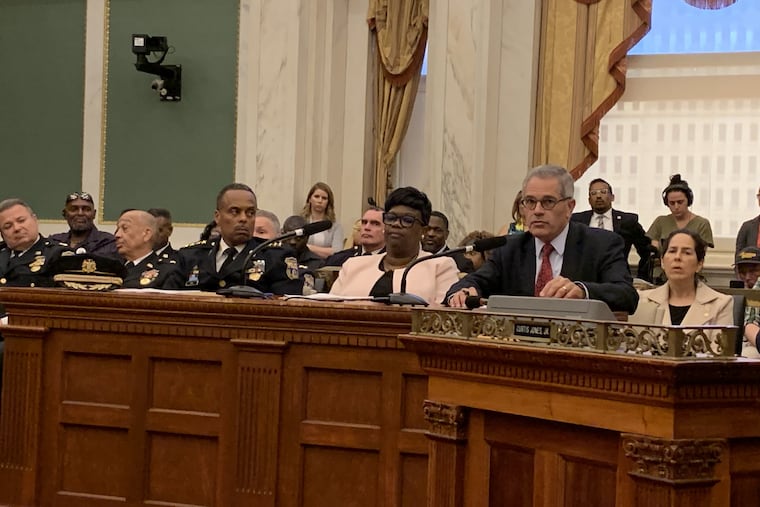How to stem Philly’s gun violence? Officials discuss obstacles, strategies at City Hall
After a violent few weeks they talked about obstacles and strategies. Finding solutions might be more difficult.

Targeted policing. The impact of scandals within the department. A passionate plea for more programs in violence-prone areas.
Those were among the topics broached Wednesday as many of Philadelphia’s law enforcement leaders convened at City Hall for a public discussion on how to stem the bloodshed and gun violence that has plagued the city as the summer opens.
“We made national news for the wrong reason,” said City Councilman Kenyatta Johnson, referring to a 48-hour stretch over Father’s Day weekend in which 29 people were shot, including at a graduation party. Johnson called that incident “rock bottom.”
Johnson organized what he called the “emergency meeting” in Council chambers, and attendees included Police Commissioner Richard Ross, District Attorney Larry Krasner, and the deputy managing director for criminal justice and public safety, Vanessa Garrett Harley.
The hearing touched on familiar topics, and surefire solutions were not immediately apparent. Still, speakers discussed issues ranging from tougher gun laws to police overtime and blight reduction.
As of Tuesday, according to police statistics, 661 people had been shot this year in Philadelphia, a 7 percent increase over the same stretch last year. Homicides were also up, with 160 killings recorded through Tuesday, a 10 percent uptick.
Here are three topics discussed during the meeting.
‘Operation Pinpoint’
In response to a call last year from Mayor Jim Kenney to develop a citywide violence reduction plan, the Police Department rolled out a program dubbed “Operation Pinpoint,” an extension of its efforts in recent years to devote manpower to specific areas prone to high levels of violence.
Ross said Wednesday that the strategy has shown some early success: Year-to-date shooting victims within seven areas flagged by police are down 20 percent compared with last year, even as shootings are up citywide.
But after the violent Father’s Day weekend, the commissioner said nearly all of those crimes were committed outside the “pinpoint areas” and acknowledged that the areas may need to be tweaked or expanded in response. He did not specify where the areas are, or how they might be adjusted.
Facebook scandal impact
The surge of shootings has coincided with another blemish for the Police Department: the benching of 72 officers over allegations that they made racist or otherwise offensive Facebook posts.
At Wednesday’s session, several Council members asked how the temporary staff reductions might impact the ability of police to patrol neighborhoods this summer. Ross said the department would be able to handle the staffing disruptions.
Johnson questioned whether such a scandal could contribute to the city’s homicide “clearance rate” — the proportion of cases considered “cleared” by arrest or other means — which has hovered at or below 50 percent for several years.
Krasner said such misbehavior undoubtedly makes it harder for police to build trust with city residents. And he said Ross’ decision to remove those officers from the street was the right one — to show that such conduct would not be tolerated.
Their removal had "a good impact,” the district attorney said, prompting a wave of applause from the audience.
A demand for answers
Councilwoman Helen Gym acknowledged the roots of the city’s gun violence epidemic were planted decades ago. Still, she gave an impassioned plea for officials to come up with short-term responses to the crisis:
Which recreation centers or libraries near violence hot spots can offer extended hours?
Can more money in existing budgets be put toward sealing and beautifying vacant properties?
Is there a way to get grief counselors or crisis response teams into neighborhoods this summer?
Those questions Gym posed in rapid-fire fashion, allowing barely any time for Ross, Garrett Harley, or Krasner to respond.
“Why not go all-in now?” she asked. “We don’t need more task forces. Let’s go all-in now.”
Her question drew cheers from the audience. But no real answers.